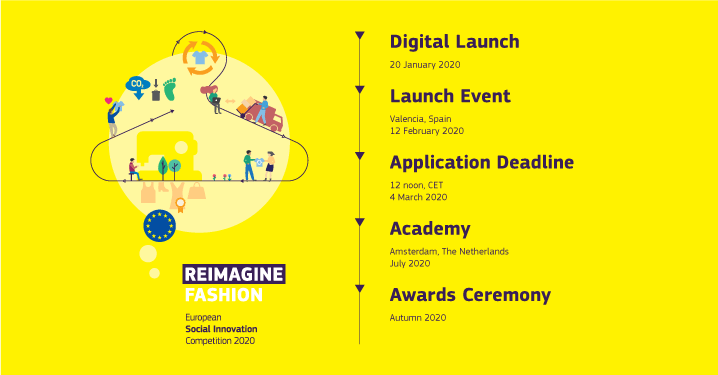
UNEP chief: Nearly 3 bn people face water scarcity.. Over 90% of disasters are water-related
Nearly three billion people face water scarcity. Over 90 percent of disasters are water-related, including ...

The European Commission channeled €50,000 for each of the three finalists of the 2020 European contest Remagine Fashion which aimed at changing behaviors for sustainable fashion.
The European Social Innovation Competition (EUSIC) – under the theme of Reimagine Fashion – is a challenge prize run by the European Commission across all EU countries and Horizon 2020 associated countries. Organized in memory of Diogo Vasconcelos, the competition calls all Europeans to come up with solutions to the problems affecting the society.
The competition is calling for ideas and ventures that aim to improve the environmental and social impact of the European fashion market through the development of new products, services and processes, and innovative business models.
The innovations should aim to reduce the overall environmental footprint and improve the societal impact of the fashion market, help make it more accessible and fairer, and aspire to change behaviors in a sustainable way.
Solutions should clearly aim to deliver impact, pursue sustainability, and be scalable or replicable post-competition – at local, national or European level.
The contest addresses three main categories; solutions for sustainable use and consumption, solutions for sustainable production and solutions for improving the end of life stage.
Under the category of solutions for sustainable use and consumption, the contest encourages changing consumption patterns and behaviors regarding the linear use of ‘fast’ fashion; extending the life cycle of fashion products; and reducing the use and consumption of fashion and textiles through innovative business models in favor of reuse, upcycling and sharing.
It also aims at making sustainable and fair fashion more broadly accessible as well as stimulating socially inclusive processes throughout the fashion value chain.
Under the category solutions for sustainable production, the contest address net zero waste and climate neutral fashion and textiles production; closed loop fashion and textiles systems; sourcing of alternative, sustainable feedstock; innovative techniques that build on traditional or local crafts for socially sustainable products; and innovations that reduce the environmental footprint of the fashion market.
The category of solutions for improving the end of life stage addresses environmentally and socially respectful ways of recycling textiles, while maintaining their value as well as reuse of textile by-products before they become waste.
Nearly three billion people face water scarcity. Over 90 percent of disasters are water-related, including ...
IFC announced a financing package for Egypt’s leading private sector bank, CIB, to strengthen the ...
The COP29 Presidency of Azerbaijan today announced the agreement of the Baku Finance Goal (BFG), ...


اترك تعليقا